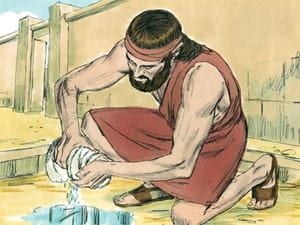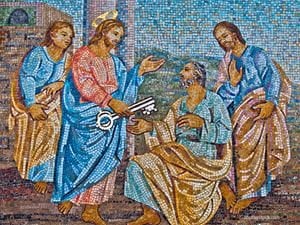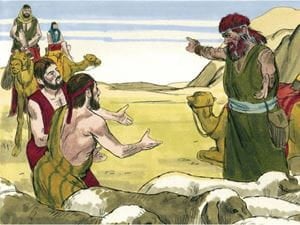In this life, you are bound to fail. Many of us take our failures personally. We believe that our poor performance is evidence that we are not good enough. Our success becomes so tightly woven into our identity; it becomes impossible to separate the two. The truth is that while we are imperfect beings, God accepts us for who we are and who we are not. Often, God chooses those who are not perfectly primped and polished for a purpose. Through their experiences, they were able to teach us many lessons and showcase God’s grace. When we accept that we are not perfect beings and embrace what we were selected to do, we receive God’s ultimate calling in our lives. Here are six Bible characters who prove failure isn’t fatal.
Joseph

Joseph’s story begins in the Book of Genesis. He was the eleventh son of Jacob and the first son of his favored wife, Rachel. Scripture tells us that Jacob “loved Joseph more than any of his other sons because he had been born to him in old age, and he made an ornate robe for him.” Joseph’s brothers were unhappy that their father favored him, and they grew to resent their brother. Their resentment grew when Joseph shared a prophetic dream that revealed he would rule over his family one day. His brothers planned to kill him in the wilderness, but things didn’t go according to plan. He was abandoned and later picked up by merchants who planned to sell him into slavery. While he was enslaved, he meets a few people who serve the pharaoh and can interpret them. He connects with the pharaoh. After he accurately interprets the pharaoh’s dream, his life is dramatically transformed after he was made the second command in Egypt.
While Joseph may not seem like a failure, there were times in his journey where he likely felt like one. His brothers rejected him, he was falsely accused of rape which led him to prison, and his life was turned upside down. Thankfully, he was taught the scriptures early and knew about the sovereignty of God. His story reveals that there is a bigger purpose behind our failures and sufferings. It wasn’t until Joseph grew up that he was able to see that his suffering could be used to help others.
Gideon

Gideon’s story is referenced in Judges chapters six and eight. Recognized as the reluctant warrior, he is also mentioned in Hebrews 11:32 with the heroes of faith. Gideon was a lot like us. He doubted his own abilities and suffered many failures and defeats. Gideon eventually put God to the test three times. God was patient with Gideon as he had chosen him to defeat the Midianites responsible for impoverishing the land of Israel through their continuous raids. God constantly assured Gideon what His mighty power could accomplish and how he could work through him. Gideon was aware of his own failures, weaknesses, and the task ahead of him. This made him the perfect vehicle for the Lord to work through. Ultimately, through Gideon’s story, we can accomplish great things when we don’t focus on our failures and weaknesses and trust God’s guidance. When we test God, it is a sign of weak faith.
Peter

Peter is a prime example of the ways that Jesus loves imperfect people. Throughout the Bible, we see several of Peter’s failures. Some of those failures seem small, like when he does not understand the Parable of the 4 Soils. In that moment, he instructs him on the parable’s meaning without rejecting him referenced in Matthew 15:16. Then, Peter failed to stand by Jesus’ side and falls asleep in the Garden of Gethsemane right before Jesus is killed. When Jesus finds them sleeping, he disciplines and instructs them, saying, “The flesh is weak, but the spirit is willing. Pray that you may not fall into temptation.” Jesus does not reject them then. Then, we look at Matthew 26:74, when Peter denies Jesus in the public arena. He is completely overwhelmed by his failure, weakness and sin that he quits the Apostolic Team and goes back to being a fisherman until Jesus restores him. In these moments, we see that Jesus always guides, instructs, sometimes disciplines and corrects Peter. However, Jesus never rejects Peter. He just calls him into deeper goodness. Peter failed repeatedly, and Jesus loved him no less.
Paul

Paul is one of the greatest biblical examples of learning from his failure. When we first read about Paul, who was then named Saul, he was an accomplice to murder. At the time, Paul was guarding the clothes of a mob that was stoning Stephen to death. Stephen’s only crime was speaking about Jesus. In Acts 8:1, we read that Paul was right there giving approval of Stephen’s death. We see Paul capture Christians in Jerusalem and put them in jail. We also see Paul persecuting Christians and voting for many of them to be killed. It wasn’t until Paul had an incredible encounter with Jesus while he was on the way to Damascus that he became a believer. Ultimately, Paul learned from his failure. He discovered that he had failed in his attempts to serve God. Instead of serving God, he was persecuting Him. Paul didn’t just learn from his failures. He turned his life around completely. He no longer persecuted but spread the gospel of Jesus until his death. Paul’s conversion story is remarkable and gives us a true look at how the gospel can really work on someone, transforming them from the inside out.
Moses

If you read through the entire Book of Exodus, you will see countless examples of Moses’ failures. When God called Moses to deliver the Israelites, he gave God a ton of excuses. He felt he was undeserving of this role and ill-equipped. He knew he had failed, sinned, killed, lied, ran away, betrayed his family’s confidence, among other things. While Moses had his excuse, God guided Moses, and he persevered. He insisted that Moses was called for his role, and if he believed and kept the faith, he would eventually lead the people of Israel out of slavery. Moses was a biblical figure who was put to the test he could not pass. Moses carried an entire nation for 40 long years in the wilderness. He developed the devotion of a man who eventually spent many weeks on a mountain top with little food or drink studying God’s divine message. While Moses had his failures, he ultimately achieved the goals God set before him.
Jacob

Jacob lied and connived. His name “deceiver” characterizes a great deal about his life. However, he made promises to God, which remained faithful. When God appeared to Jacob, he believed His promises. Despite his failures and faults, God chose Jacob to be the leader of a great nation. When we look back at scripture, we can’t find any great wisdom or bravery in Jacob, so to speak. We may be tempted to look at Jacob as God’s passive instrument. The truth is, in looking at Jacob’s life, we discover that in spite of our feelings, God will continue to use us in His plan.
It is common for us to focus on our flaws, our failures and our shortcomings. Yet, God doesn’t see that. He focuses on something entirely different. God can see who we are destined to be. He will put the broken puzzle pieces of our lives back together and use them for good. Praise be to God!
